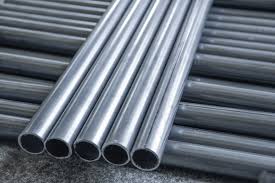Known for their strength, durability, and ability to withstand high pressure, iron pipes are used in various applications, from water supply systems to industrial machinery. Despite the growth of other materials like PVC and copper, iron pipe continue to be in demand due to their superior mechanical properties.
In this article, we will explore the different types of iron pipes, their uses, and why they remain an integral part of modern construction and industrial projects.
Types of Iron Pipes
Iron pipes are generally classified into two main types: cast iron pipes and ductile iron pipes.
Cast Iron Pipes
Cast iron pipes, which have been in use for centuries, are known for their excellent resistance to corrosion and high pressure. These pipes are produced by casting molten iron into molds, which gives them their characteristic strength and weight. Cast iron pipes are typically used in underground water and sewage systems, as their thick walls and strength allow them to withstand the stresses of soil pressure and external impacts.
There are two primary types of cast iron pipes:
Gray Cast Iron Pipes: These are the most common type of cast iron pipe, used extensively in older plumbing systems. They are affordable and have a smooth inner surface, making them ideal for water transportation.
White Cast Iron Pipes: This type of iron is less commonly used but has higher tensile strength and wear resistance. It’s often found in specialized applications that require enhanced durability.
Ductile Iron Pipes
Ductile iron pipes are an improved version of cast iron pipes, designed to overcome some of the limitations of cast iron, such as brittleness. These pipes are made by adding small amounts of magnesium to molten iron, which enhances their ductility and makes them more resistant to breaking under tension. As a result, ductile iron pipes are more flexible and easier to handle during installation.
Ductile iron pipes are widely used in modern water supply systems, sewage lines, and industrial applications. They can handle higher pressures and are more resistant to corrosion, making them a popular choice in large-scale construction projects.
Key Uses of Iron Pipes
Iron pipes are incredibly versatile and are used in a variety of applications across different sectors. Some of the most common uses include:
- Water Supply Systems
Iron pipes, especially ductile iron, are commonly used in water supply systems due to their strength and corrosion resistance. These pipes can handle high pressure and are ideal for transporting drinking water, wastewater, and other fluids. Ductile iron pipes are preferred in urban and rural water distribution networks because of their reliability and long service life.
- Sewage and Drainage Systems
Cast iron pipes have been a staple in sewage and drainage systems for many years. Due to their resistance to corrosion, these pipes are well-suited for handling the harsh conditions found in sewage lines. While modern installations may use a variety of materials, iron pipes are still a common choice in older systems or in areas where high durability is required.
- Industrial Applications
In industrial settings, iron pipes are often used to transport fluids, gases, and chemicals under high pressure. They are used in refineries, power plants, and factories where strength and the ability to withstand harsh conditions are paramount. Ductile iron pipes, in particular, are favored in such applications because of their resistance to cracking under stress.
- Fire Sprinkler Systems
Iron pipes are also used in fire sprinkler systems due to their strength and ability to carry high-pressure water. These pipes can be used for both residential and industrial sprinkler systems, providing a reliable and long-lasting solution to fire safety.
- Gas Transportation
Iron pipes are used in the transportation of natural gas and other gases. Their ability to withstand high pressure and corrosion makes them ideal for gas pipelines. Ductile iron pipes, in particular, are used in the oil and gas industry for pipelines that carry petroleum and natural gas.
Advantages of Iron Pipes
Iron pipes offer several advantages that make them a preferred choice in many applications:
- Strength and Durability
Iron pipes are known for their exceptional strength, which allows them to withstand heavy loads, pressure, and impacts. This makes them ideal for use in applications that require durability and reliability, such as water supply systems and industrial pipelines.
- Corrosion Resistance
Iron pipes, particularly ductile iron, have excellent resistance to corrosion, which extends their lifespan. This makes them ideal for use in underground water systems, sewage systems, and other environments where exposure to moisture and chemicals is common.
- Cost-Effectiveness
Iron pipes are often more cost-effective than alternative materials like copper or steel. While the initial cost of installation may be higher due to their weight and handling requirements, the long-term savings from their durability and low maintenance make them an economical choice.
- Versatility
Iron pipes can be used in a wide range of applications, from residential plumbing to large-scale industrial projects. Their versatility makes them a go-to choice for construction, infrastructure development, and manufacturing.
- Easy Installation and Repair
Despite their weight, iron pipes are relatively easy to install and repair. They are available in various sizes and lengths, making them suitable for different projects. If a pipe needs to be replaced or repaired, the process is straightforward, reducing downtime and maintenance costs.
Conclusion
Iron pipes, with their strength, durability, and corrosion resistance, have stood the test of time as one of the most reliable materials for construction and industrial use. Whether you’re building a water supply system, laying down a sewage line, or establishing industrial pipelines, iron pipes are an excellent choice for any project that demands reliability and longevity.
If you are looking for best quality steel online, please visit our website : www.steeloncall.com or you can contact us through our toll-free number: 18008332929
#IronPipes #IronPipesPrice #ConstructionMaterials #WaterPipes #SewagePipes




